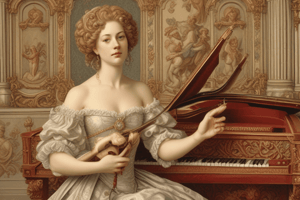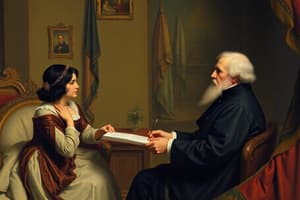Podcast
Questions and Answers
What is the meaning of the word 'opera' in Italian?
What is the meaning of the word 'opera' in Italian?
- Drama
- Music
- Art form
- Work (correct)
Which of the following elements is not considered a part of opera?
Which of the following elements is not considered a part of opera?
- Music
- Visual spectacle
- Microphones (correct)
- Drama
What is the term used for the text of an opera?
What is the term used for the text of an opera?
- Melody
- Overture
- Libretto (correct)
- Lyric
Which of the following is considered the first great composer of opera?
Which of the following is considered the first great composer of opera?
Where did opera originate?
Where did opera originate?
Which of the following is not a source that opera is often based on?
Which of the following is not a source that opera is often based on?
What aspect did France emphasize in the development of opera?
What aspect did France emphasize in the development of opera?
During the 18th century, what saw an explosion across Europe?
During the 18th century, what saw an explosion across Europe?
In the late 19th and early 20th century, composers like Verdi and Puccini combined music, drama, poetry, and staging into what term?
In the late 19th and early 20th century, composers like Verdi and Puccini combined music, drama, poetry, and staging into what term?
What continues to inspire and delight audiences around the world according to the conclusion of the text?
What continues to inspire and delight audiences around the world according to the conclusion of the text?
Which country favored complex orchestration in the development of opera?
Which country favored complex orchestration in the development of opera?
What is a common theme in contemporary opera based on the text?
What is a common theme in contemporary opera based on the text?
Flashcards
What is Opera?
What is Opera?
A captivating art form that combines drama, music, and visual spectacle, considered the most complete art form due to its integration of the performing arts.
What is a libretto?
What is a libretto?
The text of an opera, including stage directions, written by a librettist.
First true opera?
First true opera?
The earliest opera, composed by Jacopo Peri in 1598.
Who was Claudio Monteverdi?
Who was Claudio Monteverdi?
Signup and view all the flashcards
What was the origin of opera?
What was the origin of opera?
Signup and view all the flashcards
What is liturgical drama?
What is liturgical drama?
Signup and view all the flashcards
What is the core of opera?
What is the core of opera?
Signup and view all the flashcards
When was the Golden Age of Opera?
When was the Golden Age of Opera?
Signup and view all the flashcards
What happened in the late 19th and early 20th century?
What happened in the late 19th and early 20th century?
Signup and view all the flashcards
How has opera evolved in the modern era?
How has opera evolved in the modern era?
Signup and view all the flashcards
What is the lasting significance of Opera?
What is the lasting significance of Opera?
Signup and view all the flashcards
What makes opera the most complete art form?
What makes opera the most complete art form?
Signup and view all the flashcards
Study Notes
Opera: The Complete Art Form
Introduction
Opera, from the Italian word for 'work,' is a captivating art form that combines multiple elements: drama, music, and visual spectacle. It is considered the most complete art form because it offers depth, texture, and richness by integrating all aspects of the performing arts. Originating in Italy in the early 17th century, opera has evolved through the centuries, reflecting cultural shifts, technological advancements, and creative innovations.
Understanding Opera
At its core, opera is a dramatic story told through song and music. It is often based on pre-existing sources, such as novels, plays, or historical events. Opera singers perform without microphones, and the orchestra provides live accompaniment. The libretto, the text of an opera, is written by a librettist and includes stage directions.
History of Opera
Early Beginnings
The concept of opera developed from the ancient Greeks' fusion of poetry, music, and drama. In the 1100s, religious stories were set to music in a style known as liturgical drama. The first true opera, Daphne, was composed by Jacopo Peri in 1598. Claudio Monteverdi, born in 1567, was the first great composer of opera. His work in the early 17th century laid the foundation for future developments in the genre.
Spread Across Europe
Italy was the birthplace of opera, but it quickly spread throughout Western Europe. Each country influenced the development of opera, with Italy focusing on beautiful singing, France emphasizing visual spectacle, and Germany favoring complex orchestration. As opera evolved, it reflected the unique stories and musical styles of each country.
18th and 19th Century
The 18th century saw an explosion of opera across Europe. Opera houses were built in major cities, and new operas were commissioned for each season. In the late 19th and early 20th century, composers like Verdi and Puccini combined music, drama, poetry, and staging into what they called 'music drama.' Opera became even more diverse with the emergence of different styles and genres.
Contemporary Opera
Today, opera continues to evolve, incorporating contemporary themes and issues. New operas are composed regularly, often based on the works of celebrated authors or inspired by current events. Opera houses around the world showcase a variety of productions, from classic repertoire to innovative new works.
Conclusion
Opera is a unique and captivating art form that continues to inspire and delight audiences around the world. Its rich history and enduring popularity are a testament to its ability to capture the human experience through music, drama, and visual spectacle. Whether you're a seasoned opera-goer or just discovering this art form, there's always something new to explore and appreciate.
Studying That Suits You
Use AI to generate personalized quizzes and flashcards to suit your learning preferences.




